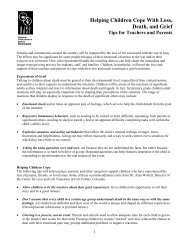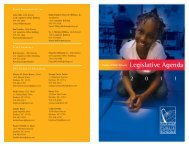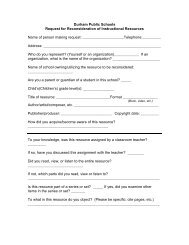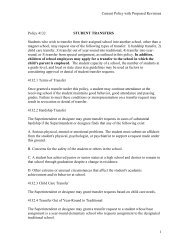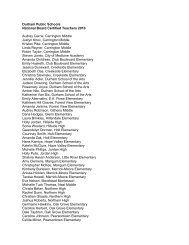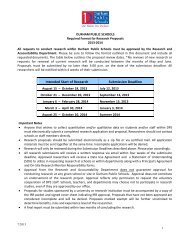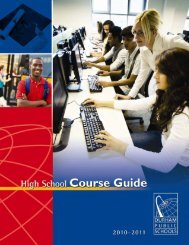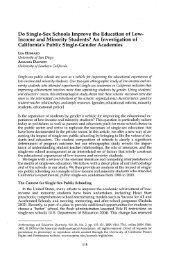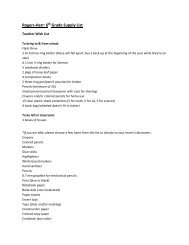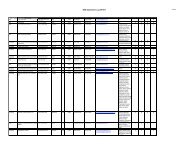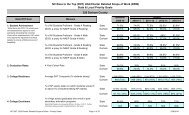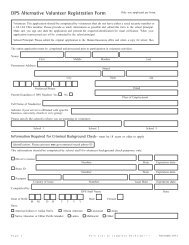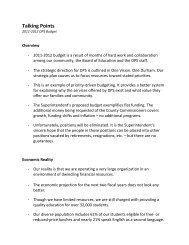2011-12 High School Course Offerings - Durham Public Schools
2011-12 High School Course Offerings - Durham Public Schools
2011-12 High School Course Offerings - Durham Public Schools
Create successful ePaper yourself
Turn your PDF publications into a flip-book with our unique Google optimized e-Paper software.
Occupational English IV 92130<br />
Students in English IV will integrate all the language arts skills gained<br />
throughout their education.The curriculum both affirms these skills<br />
and equips the students to be life-long learners. Students continue<br />
to explore expressive, expository, argumentative, and literary contexts<br />
with a focus on British Literature.The emphasis in English IV is<br />
on argumentation by developing a position of advocacy through<br />
reading, writing, speaking, listening, and using media.<br />
Occupational Intro to Mathematics 92200<br />
Introductory Mathematics provides students a survey of preparatory<br />
topics for high school mathematics, including the foundations<br />
for high school algebra and geometry. Appropriate technology,<br />
from manipulatives to calculators, should be used regularly for<br />
instruction and assessment.<br />
Occupational Algebra I 92210<br />
Algebra 1 continues the study of algebraic concepts. It includes<br />
operations with polynomials and matrices, creation and application<br />
of linear functions and relations, algebraic representations of geometric<br />
relationships, and an introduction to nonlinear functions.<br />
Students will be expected to describe and translate among graphic,<br />
algebraic, numeric, tabular, and verbal representations of relations<br />
and use those representations to solve problems. Appropriate<br />
technology, from manipulatives to calculators and application software,<br />
should be used regularly for instruction and assessment.<br />
Occupational Financial Management 92220<br />
Financial Management assists with preparing students to understand<br />
economic activities and challenges of individuals and families, the role<br />
of lifestyle goals in education and career choices, procedures in a<br />
successful job search, financial forms used in independent living, and<br />
shopping options and practices for meeting consumer needs.<br />
Occupational Applied Science 92310<br />
Students learn about energy, the environment, conservation, and<br />
chemical exposure. The students also study human body systems<br />
and learn how they work together to regulate health. Students<br />
explore these topics through hands-on activities and by applying<br />
the concepts they learn to real world situations.<br />
Occupational Biology 92320<br />
Students learn about the structure and function of living organisms:<br />
plants and animals. Topics include ecosystems, evolution, genetics,<br />
and the basics of cellular biology. After completing the course, students<br />
will take the North Carolina Biology End-of-<strong>Course</strong> test.<br />
Occupational Social Studies I 92450<br />
This course provides students with the basic economic, government,<br />
and political knowledge they will need to become responsible<br />
citizens and consumers. Beginning with the history of the<br />
United States including the Constitution and its amendments, the<br />
three branches of government, and the major laws that impact<br />
citizens, students will move on to learn about local government,<br />
its role and jurisdiction, and issues of personal citizenship.<br />
Occupational Social Studies II 92460<br />
This course teaches students the skills they will need to achieve the<br />
independence and self-determination essential for successful adult<br />
outcomes. Students will have opportunities to apply these skills to<br />
situations they will face after they graduate from high school.<br />
Occupational Preparation I 92400<br />
This course introduces students to the attitudes, behaviors, and<br />
habits needed to obtain employment, become a valued employee,<br />
and be considered for career advancements. Students will participate<br />
in school-based learning activities to develop a positive work<br />
ethic including on-campus vocational training in school factories,<br />
work-based enterprises, and the operation of small businesses.To<br />
pursue their career interests, students will be able to gain hands-on<br />
vocational training through Workforce Development Education<br />
courses. Students will begin the process of formal career planning.<br />
Occupational Preparation II 92410<br />
This course provides students with a repertoire of basic skills that<br />
will serves as a foundation for future career application. Basic<br />
skills include the ability to manage resources, use technology, solve<br />
problems, learn new job skills, and regulate one's energy to stay<br />
productive throughout the work day. Students also learn how to<br />
communicate their own needs and ideas, get along with people<br />
from different backgrounds, and work productively on teams.<br />
Students will expand their school-based learning activities to<br />
include on-campus jobs and refine their job-seeking skills.<br />
Occupational Preparation III 92420<br />
Students refine the skills they learned in Occupational<br />
Preparation I and II through community-based training, job shadowing,<br />
internships, job sampling, situational assessment, cooperative<br />
education, and apprenticeships. Students will have multiple<br />
opportunities to demonstrate effective work habits, develop leadership<br />
skills, and practice self-determination.<br />
Occupational Preparation IV 92430<br />
This course gives students the opportunity to synthesize the skills<br />
they acquired in previous Occupational Preparation courses and<br />
apply them to their personal career choice. Students solve workrelated<br />
problems, practice self-advocacy, and learn about the theoretical<br />
and practical aspects of their career choice. To earn an<br />
Occupational <strong>Course</strong> of Study diploma, students must complete<br />
360 hours of competitive employment in a community setting.<br />
As the final step to securing employment, students will develop a<br />
job placement portfolio that includes an educational and vocational<br />
record of their high school experience.<br />
DPS <strong>High</strong> <strong>School</strong> <strong>Course</strong> Guide 47



